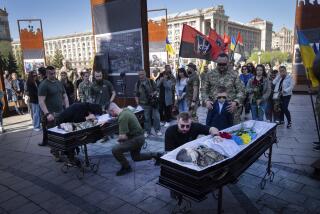U.S. Asks if ‘Seismic Event’ in Russia Was Nuclear Test
- Share via
WASHINGTON — The Clinton administration said Thursday that it has demanded an explanation from Moscow about a “seismic event” near Russia’s Arctic nuclear test range that may have been an explosion violating the spirit of the comprehensive test ban treaty, which has yet to be ratified, and Russia’s own self-declared moratorium.
State Department spokesman James P. Rubin said seismic sensors on the island of Novaya Zemlya, a longtime test site for nuclear weapons, picked up vibrations Aug. 16 that “had explosive characteristics.” But he added that the information “is not conclusive.”
In Moscow, Russian officials insisted that there had been no nuclear test.
“I can firmly tell you that no nuclear tests that involve nuclear fusion and thus violate Russia’s moratorium and international agreements are taking place in Novaya Zemlya,” said Georgy Kaurov, spokesman for Russia’s Ministry of Atomic Energy.
Deputy White House Press Secretary Joe Lockhart, on Martha’s Vineyard in Massachusetts where President Clinton is on vacation, declined to say whether the administration accepts the Russian denial. “We have not reached a conclusion on what the seismic event is and its exact nature, so we are not ready to conclude one way or the other,” Lockhart said.
A State Department official said: “We are reviewing the information, and we are discussing it with Russia and with other countries. We are not able to confirm what took place.”
Russia has no legal obligation to refrain from nuclear tests. But Moscow declared a unilateral moratorium on testing in 1992, shortly after it completed its last test series. And Russia has signed the Comprehensive Nuclear Test Ban Treaty--negotiated last year at the United Nations--but has not yet ratified it.
The United States also declared a voluntary end to nuclear tests in 1992 and has signed but not ratified the treaty. Nations are normally expected to abide by treaties they have signed while ratification is pending, but there is no obligation under international law to do so.
The State Department official said the seismic event, if it was an explosion, was “small, very small” by the standards of nuclear weaponry.
An official of the Union of Concerned Scientists said the incident offers proof that the test ban treaty--if it ever takes effect--can be monitored and enforced. He said the sensors that detected the seismic event are part of a still-incomplete system of monitoring stations.
Rubin said the treaty, if it had been in force, would have proved useful. “The test ban treaty would provide opportunity for on-site inspection” that would clarify the situation, he said.
Nevertheless, when the treaty comes up for ratification in the Senate, the controversy is expected to be cited by treaty opponents as proof that the Russians cannot be trusted to abide by the pact.
To take effect, the treaty must be signed and ratified by all 44 countries known to possess nuclear reactors. At least one, India, has vowed that it will never sign.
But supporters of the treaty say it establishes a strong moral obligation not to test. All five nations--the United States, Russia, China, Britain and France--that acknowledge possessing nuclear weapons have signed.
Kaurov, the official of the Russian Ministry of Atomic Energy, said Russia is maintaining the nuclear test site in case Moscow decides to resume testing.
“They just keep all the facilities maintained in a proper way,” he said. “If need be--that is, in case Russia decides to break the international agreements--the testing facilities will become fully operable within a year from the moment of the announcement of such a decision by Russia.”
Times staff writers Richard C. Paddock in Moscow and James Gerstenzang in Edgartown, Mass., contributed to this report.
More to Read
Sign up for Essential California
The most important California stories and recommendations in your inbox every morning.
You may occasionally receive promotional content from the Los Angeles Times.













